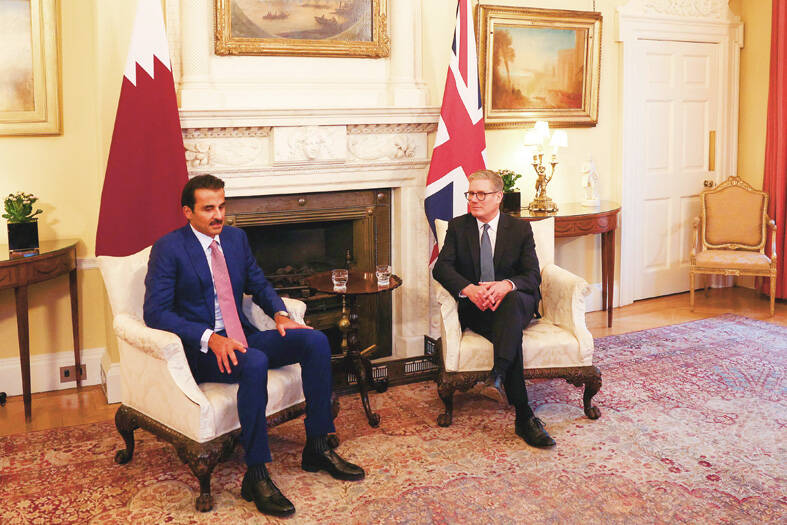British Prime Minister Keir Starmer began a multi-day visit to the Gulf yesterday, his first trip to the region since taking office, seeking stronger economic and defense ties with the United Arab Emirates (UAE) and Saudi Arabia.
The UK government in a statement on Saturday said Starmer aims to boost investment and deepen defense and security partnerships, describing the two Middle Eastern countries as “some of the UK’s most vital modern-day partners.”
Starmer, elected to lead the world’s sixth-largest economy in July, arrived in the UAE yesterday, where he is due to hold talks with UAE President Sheikh Mohamed bin Zayed Al Nahyan today. He would fly to Saudi Arabia later on the same day to meet Saudi Crown Prince Mohammed bin Salman.

Photo: Reuters
Starmer would also be looking to repair relations between the UK and UAE that soured under the previous Conservative government after an Abu Dhabi-backed bid to buy the Telegraph newspaper failed.
Stability in the Middle East is expected to be “high up the agenda” during the visit, including the pressing need for a ceasefire between Israel and Gaza, the release of all hostages and the urgent acceleration of aid into Gaza, the statement added.
“There is huge untapped potential in this region,” Starmer said, who is aiming to secure investment from wealthy Gulf states to help fund his mission to rebuild the UK’s aging infrastructure and shift to cleaner energy.
“I will be making the case to accelerate progress on the Gulf Cooperation Council (GCC] Free Trade Agreement, deepen our research and development collaboration and partner on projects of the future,” he added.
The government counts both Gulf monarchies as major investors, with trade between the UK and the UAE worth £23 billion (US$29.3 billion) and that with Saudi Arabia estimated at £17 billion.
British trade ministers visited the region in September to try to advance free trade deal talks with the GCC, which also includes Bahrain, Kuwait, Oman and Qatar. Such a deal is estimated to increase bilateral trade by 16 percent and potentially add £8.6 billion a year in the long run.
Qatari Emir Sheikh Tamim bin Hamad Al Thani was in the UK for a state visit last week, where he was welcomed by British King Charles and Starmer in a show of ceremonial pageantry. The trip ended with the two countries pledging to bolster their investment relationship.
Starmer is scheduled to travel to Cyprus to meet Cypriot President Nikos Christodoulides tomorrow, the first bilateral visit by a UK leader to the Commonwealth country in more than five decades, to discuss closer cooperation on shared security challenges in the region, the statement added.
The Gulf visit would be Starmer’s 15th international trip since he entered Number 10 on July 5.
Opponents have criticized the amount of time he has spent out of the country, but allies insist the trips have been vital to get to know other world leaders.
Starmer, 61, has been insisting in capitals that “Britain is back on the world stage” following rancor over its departure from the EU.

Indonesia and Malaysia have become the first countries to block Grok, the artificial intelligence (AI) chatbot developed by Elon Musk’s xAI, after authorities said it was being misused to generate sexually explicit and nonconsensual images. The moves reflect growing global concern over generative AI tools that can produce realistic images, sound and text, while existing safeguards fail to prevent their abuse. The Grok chatbot, which is accessed through Musk’s social media platform X, has been criticized for generating manipulated images, including depictions of women in bikinis or sexually explicit poses, as well as images involving children. Regulators in the two Southeast Asian

COMMUNIST ALIGNMENT: To Lam wants to combine party chief and state presidency roles, with the decision resting on the election of 200 new party delegates next week Communist Party of Vietnam General Secretary To Lam is seeking to combine his party role with the state presidency, officials said, in a move that would align Vietnam’s political structure more closely to China’s, where President Xi Jinping (習近平) heads the party and state. Next week about 1,600 delegates are to gather in Hanoi to commence a week-long communist party congress, held every five years to select new leaders and set policy goals for the single-party state. Lam, 68, bade for both top positions at a party meeting last month, seeking initial party approval ahead of the congress, three people briefed by

The Chinese Embassy in Manila yesterday said it has filed a diplomatic protest against a Philippine Coast Guard spokesman over a social media post that included cartoonish images of Chinese President Xi Jinping (習近平). Philippine Coast Guard spokesman Jay Tarriela and an embassy official had been trading barbs since last week over issues concerning the disputed South China Sea. The crucial waterway, which Beijing claims historic rights to despite an international ruling that its assertion has no legal basis, has been the site of repeated clashes between Chinese and Philippine vessels. Tarriela’s Facebook post on Wednesday included a photo of him giving a

ICE DISPUTE: The Trump administration has sought to paint Good as a ‘domestic terrorist,’ insisting that the agent who fatally shot her was acting in self-defense Thousands of demonstrators chanting the name of the woman killed by a US federal agent in Minneapolis, Minnesota, took to the city’s streets on Saturday, amid widespread anger at use of force in the immigration crackdown of US President Donald Trump. Organizers said more than 1,000 events were planned across the US under the slogan “ICE, Out for Good” — referring to the US Immigration and Customs Enforcement, which is drawing growing opposition over its execution of Trump’s effort at mass deportations. The slogan is also a reference to Renee Good, the 37-year-old mother shot dead on Wednesday in her